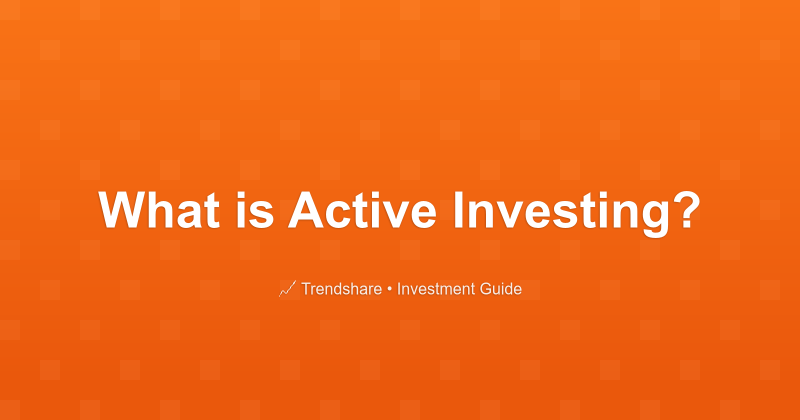
What is Active Investing?
By Ethan Mercer
Financial Technology Analyst • 10+ years in fintech and payments
An active investing strategy pursues frequent buying and selling. Why investing in stocks and funds on your own may help you build wealth in the market.
As tempting as it might be to cash out every paycheck and stuff the extra money in your mattress, that's not the optimal wealth-building strategy. Neither is buying an expensive watch, a boat, or a fancy home theater system. This, of course, is the premise of the widely-regarded book "The Millionaire Next Door". Putting your money to work for you—letting your money make more money—can produce great gains over time.
Programs such as the MyRA savings account and employer-run 401(k)s are popular because they help wage earners put their money to work by investing in some of the best businesses in the world.
Cynics might also claim that moving money out of pension funds into the stock market in general is a way to increase the amount of fees paid to "professional" money managers, but that doesn't have to be true for you.
Definition of Active Investing
Active investing is a trading strategy of buying and selling stocks in the market frequently. It's often defined in contrast to passive investing, where there's little analysis of individual stocks and only the occasional research into low-overhead funds.
Active investing is often marked by several criteria:
- Looking for inefficiencies in the price of individual stocks and tradeable securities
- Buying and selling more frequently than a passive investor's set schedule
- Researching the performance of securities and/or their underlying businesses
While this approach requires more work and activity than simple index fund investing, it doesn't have to be the stereotypical, all-consuming day trading. You could spend as little as a couple of hours a month managing your investments.
Advantages of Active Investing
Perhaps the strongest advantage of active investing is that it puts you directly in control of your investments. Rather than relying on a professional fund manager to decide what to buy and sell (and when!), you make all the choices. This goes even further than passive investing; you're not beholden to the people who decide which stocks make up the S&P 500 or Russell 2000 indexes, for example.
You also have the power to choose your target rate of return and the level of investment risk you can stand. You can even mix and match, putting 90% of your investments in steady, solid index funds and looking for tenbaggers with the rest of your portfolio.
Finally, you can spend as much or as little time as you like managing your investments. If you follow the value investing approach, you may make one or two trades every year for several years and then a handful of trades in a couple of months, depending on your goals and market conditions. The more you know, the more you'll be rewarded, but you can find bargains with a little research and a lot of patience.
Disadvantages of Active Investing
The more frequently you trade, the more you have to understand about transaction costs and the tax implications of your trades. You don't have to be a day trader, but you should understand the broad perspective of long-term versus short-term capital gains and which types of investment accounts you're working with.
Unlike the "set it and forget it" system of passive index fund investing, you need to look at price targets. Maybe you're waiting for a stock under pressure to dip to the point where it's a bargain. Maybe you've found a turnaround play that'll hit a threshold at which you want to sell it. You need to have a strategy and pay attention.
Finally, there are a lot of options for your money. You could analyze tens of thousands of stocks without even dipping your toe in the ETF market or looking at REITs or bonds or derivatives or options. Obviously you need to narrow the field somehow, but with a little bit of guidance, you can find sufficient opportunities of interest without chasing down every possible lead.
Should Value Investors Practice Active Investing?
The question almost answers itself. If, as value investors believe, the market occasionally has inefficiencies where the current price of stocks may not truly reflect the underlying value of the business, you'll have the opportunity to buy great businesses at good prices. Whether you hold them forever (a passive-active investment strategy) or hold them until they've made sufficient money that you prefer to invest it in other undervalued businesses (an active-active strategy), value investing works when you look for ways to make your money work for you.
There's no strict schedule; you can be a fantastic value investor making the right trade only once a decade, if you want. By committing to educating yourself about good stocks and looking for bargains, you've already taken an important step toward managing your own money and putting it to work as you see fit.
Investment Disclaimer
This article is for educational purposes only and does not constitute investment advice. Stock prices, financial metrics, and market conditions change constantly. Company examples are provided for illustration and should not be considered recommendations. Always verify current data from official sources such as company investor relations pages or SEC filings, assess your own risk tolerance and investment objectives, and consult a qualified financial advisor before making investment decisions. Past performance does not guarantee future results.